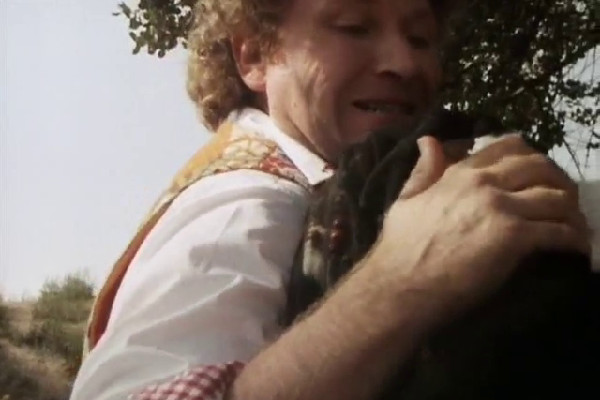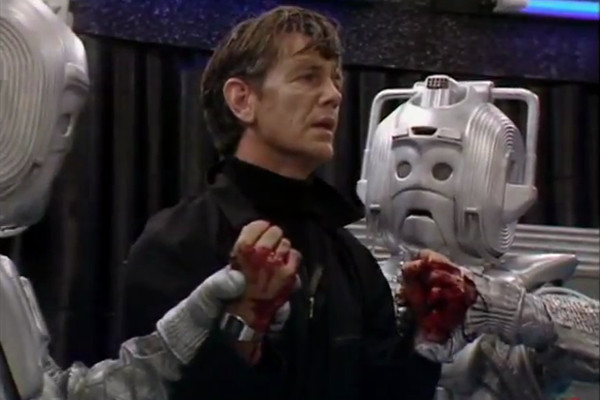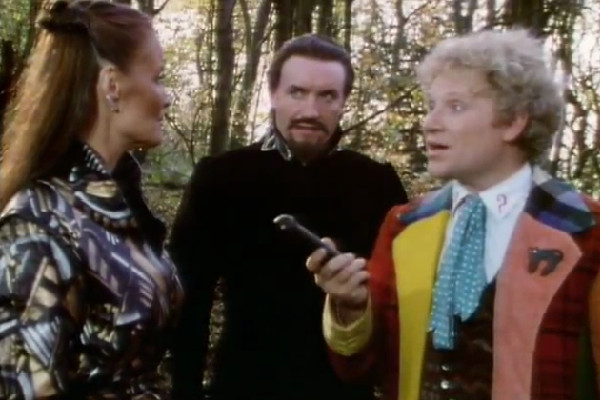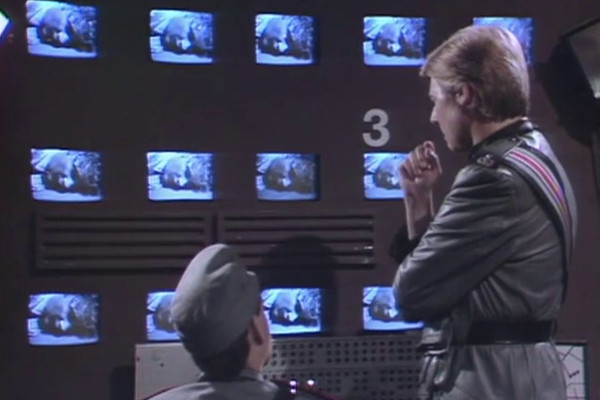


At three 45 minute episodes, The Two Doctors is slow, languid and lacking any kind of verve. It's a nasty, mean-spirited story of graphic stabbings, sledgehammer subtle moralising and the Doctor resolving a situation by committing murder. Critics of the era lay a lot of the blame at the door of a theatrical luvvie in a deeply misjudged costume. And while such criticisms are, it has to be said, often justified, this one brings back Patrick Troughton and sees no real increase in quality. It doesn't help that the majority of Troughton's dialogue sounds like a Daily Mail editorial, but it does suggest that the series was largely beyond hope at this stage.
Overlit and self-involved, it takes the group on a pointless location shoot in Spain. And although Nicola Bryant looks cute with the extra freckles, her main involvement in the story is when she appears to mouth the word "asshole" at the Doctor - not so much of a shock in today's take on the show, but jaw-dropping in the more staid series of the time. Robert Holmes was a long way from his best when he wrote the serial, though it's still arguably higher in quality than the two entries above it here. What ultimately gives The Two Doctors its lowly placing is the multiple stabbings - unnecessarily visceral and obnoxious.

Attack of the Cybermen is one of the most insular and continuity-bound stories of the original series, acting as a sequel to at least three other serials. Often tacky, it contains a messy plot with several dead ends; a demeaning outfit for Nicola Bryant and one of the worst-ever incidental scores. Yet where it really falls down is with two scenes: one, pictured above, where mercenary Lytton's hands are crushed and covered in blood, far too graphic for a series of this nature. The other is the climax where the Doctor - the hero of the series - expresses sympathy with said killer for hire. Eric Saward retooled the series as a more adult-orientated production, with a morally ambiguous lead in an increasingly nihilistic universe. Sadly, Doctor Who - a 22-year-old family show with a large child audience - wasn't perhaps the programme to host such ambitions.

Sarah Hellings is symptomatic of many of the directors of the period: her prior work had included Angels and Juliet Bravo, and she had gone on to work on the likes of Doctor Finlay and Midsomer Murders. This doesn't make her a bad director, just an unsual choice for an action-orientated SF series.
Thankfully Mark is one time it pays off, with a pseudo-historical story that lends itself to a slower pace. Writers Pip and Jane Baker come in for lots of criticism, often deservedly so, but their work here is generally passable with a kind ear. Sadly, after a fairly amiable set-up, things begin to collapse in a mess of moving trees, ostentatious quotations and - in a nod to the inappropriate content of the rest of the season - Antony Ainley's cartoonish Master kneed in the groin. That this story ranks so highly is another testament to the low quality of the era.

The entire validity of the Colin Baker era rests entirely on the top two stories here, the only examples of the run where it actually worked. That's not to say that Varos - a blistering satire on video nasties and TV violence, but put out in a run where the programme was at its most graphic - is entirely successful. Director Ron Jones allows the pace to flag, and some of the guest cast (Jason Connery and Geraldine Alexander particularly) are wooden. And for all its scathing wit, Varos has an episode that sees a man slap Peri in the face, part of the era's growing mistreatment of women.
However, two things are particularly notable in regards this story: the cliffhanger and a persistent myth. One of the programme's finest qualities was its ability to produce good cliffhangers. A sign that the production team had seemingly forgotten how to make television could be gleaned from this, in that Colin had 23 cliffhangers and 22 of them were terrible. Varos bucks this unfortunate trend by having a postmodern take on television, as the Doctor lies dead on screen and a "cut" is ordered. Lastly, a lingering myth that the Doctor pushes two men into an acid bath occurs here: the reality is that the Doctor struggles with both, one accidentally falling in, then pulling in his colleague. Overall, this is a very good story... but it should have been a great one.

The sole story that truly justifies the Colin Baker era, it suffers from all the problems that beset the rest of it: weak plot resolution, the Doctor being an unnecessary element in his own show, gratuitous violence (including against women) and a general amoral centre. This is, after all, a story where the Doctor leaves the fate of the planet in the hands of men who had once threatened to slash a woman's face open. Although the Doctor himself wouldn't be aware of this, writer Eric Saward was, and he also indulges in his favourite pasttime of killing off secondary characters when he's ran out of stuff for them to do.
Yet while all charges are true, Revelation defies all this by having a sense of style. Pitch black, perverse humour gives us references to nose picking, cannibalism and cannabis - even the bickering between the Doctor and Peri comes over as amusing banter rather than awkward clashing to fill airtime. But any complaints with the era are proved to be issues that could be overcome: Colin and Terry Molloy give their best performances under director Graham Harper, and even Colin's horrendous costume - and it IS a mistake - fails to really detract from a witty character play that's shot with genuine enthusiasm. It seems that, despite the problems with the series at this point, all it really needed to manage to stay vital was to have a good script and a decent director. It's just a shame that for the majority of the time it got neither.